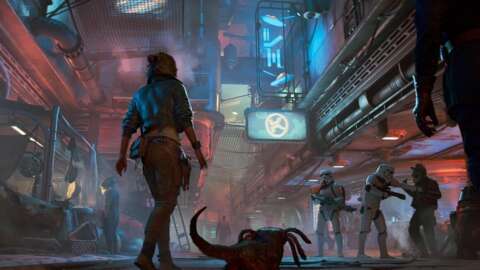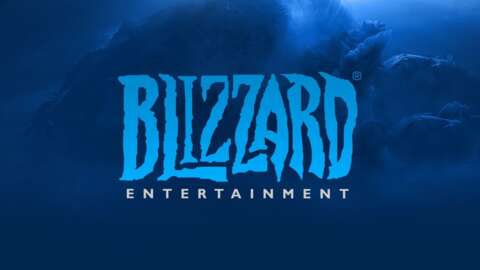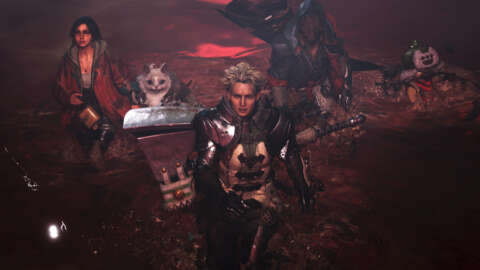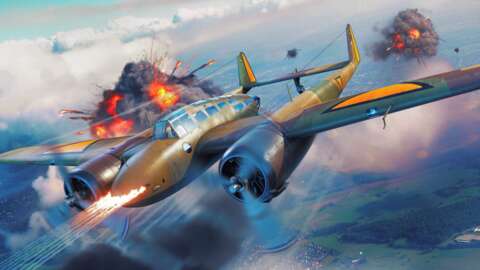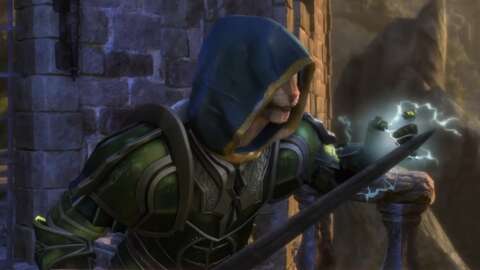Star Wars is for kids. At least, that’s the excuse that gets rolled out whenever one raises an issue with poor plotting, fart jokes, or pat moral lessons. But Star Wars also takes place in a universe with dark implications, like a fascistic Empire that turns a blind eye to crime lords who trade in sentient slaves and illicit drugs. Star Wars has long shied away from letting its seedy criminal underworld simply be unapologetically seedy, but by setting itself in the midst of it, Star Wars Outlaws may just be the scumbag simulator we’ve been waiting for.
While it would be easy to lay this problem at the feet of the kid-friendly Disney corporation, the Star Wars franchise’s unease with portraying criminals actually began much earlier, with franchise creator George Lucas. Lucas himself authored the classic ur-example of a charming dirtbag with a heart of gold, Han Solo. Years later, he apparently felt conflicted about one of pop culture’s most enduring icons being introduced as an unrepentant killer. As one of many changes made to the “Special Edition” releases of Star Wars, he altered Han’s confrontation with Greedo. What was originally Han making a wry comment and then casually offing the Rodian, was changed to Han awkwardly “dodging” a shot and then firing in self-defense.
Subsequent edits have altered the timing slightly, and the most-recent edit has Greedo more explicitly threatening to kill Han to make the latter’s actions read more as self-defense. Arguably it was always self-defense; Greedo was a bounty hunter openly stating his intentions to turn Han over to Jabba the Hutt, a ruthless crime lord who later kept Han as a trophy out of sheer spite.
The dirtbag with a heart of gold, Han Solo
The “Han shot first” controversy rocked the early internet and Star Wars fandom, but at the core of the controversy was the sense that Han Solo was supposed to be a dirtbag. That was part of his character arc. He was a scoundrel and a loner who stumbled into a cause bigger than himself with friends he loved and that moved him to change. The Han Solo that we see gently smiling at the end of Return of the Jedi is not the same Han Solo who put a smoking hole in Greedo’s torso, and that’s the whole point. Those who favor the original cut, like myself, argue that it’s actually good writing to show that a character has grown and changed as a person and is learning from their adventures. That’s why we go to the movies.
However, Lucas decided his hero needed to be more unambiguously heroic, and less dark. Since the first change was made in 1997, 20 years after the original release, Han Solo has now spent more time being a justified self-defender than a good old-fashioned dirtbag.
The kid-friendly view of crime continued into the prequels, when Obi-Wan and Anakin visit a seedy Coruscant bar in Attack of the Clones while hot on the trail of a failed assassin. Our clearest signal that this is a sleazy place is when a random patron offers Obi-Wan some death sticks. That character’s name? Elan Sleazebaggano. Subtle!
This trend continued into the Disney era with the reintroduction of Boba Fett. The popular character had lived on in expanded universe books for a long time but hadn’t been seen in the main, canonical cinematic universe since he was ignominiously and presumably killed, by accident, by a blind Han Solo in Return of the Jedi.
Fett showed back up in live action The Mandalorian, Disney’s biggest Star Wars hit on the small screen from a sheer merchandising perspective. Baby Yoda, aka Grogu, has certainly sold more lunchboxes than any other character in recent years. But Boba Fett’s appearance followed a story arc revolving around Cobb Vanth, a local Tatooine lawman played by Timothy Olyphant–essentially reprising his gunslinger roles from shows like Justified, except in a Star Wars context. Vanth had found Boba Fett’s old Mandalorian armor and was using it to clean up this-here town. But the title-character’s fanatical obsession with Beskar armor being the birthright of true Mandalorian heritage led circuitously to the reappearance of Fett to reclaim his armor.
That was all to set up The Book of Boba Fett spin-off, a miniseries focused squarely on the character. The Book of Boba Fett was, unfortunately, a boring slog–to the point where the show itself just surrendered a whole episode to its more-popular character, Din Djarin.
But at the heart of the Book of Boba Fett’s pacing problems was the simple fact that this was a story about a crime boss that was afraid to be about a crime boss. Boba Fett took over Jabba’s old crime business to become Daimyo of the Mos Espa region: a sort of gentleman-criminal ruler in the style of old mobster movies. They carve up territory, put vassals in charge of pieces of their business, and keep the gears oiled with bribes and favors between government officials. It’s a meaty idea that Star Wars could have sunk its rancor teeth into.
However, the show shied away from going into any detail about what crimes they were doing or how the enterprise worked. We saw him flexing on other crime bosses and saying his business would be run on mutual respect, but it felt toothless because the show went out of its way to tell us that Fett was a crime boss who wasn’t interested in doing crimes. Instead, Fett came off as a kindly grandpa, sometimes pushing back on other crime lords who threaten him, but otherwise minding his own business and leaving the citizenry alone. At its climax, another famed bounty hunter came to town and confronted Fett, telling him that he couldn’t just change his stripes so easily. While that could have been a compelling dramatic hook, the whole affair up to that point had been too muddied. Rather than feel like the culmination of the show, audiences were left asking: Wait, that’s what this has been about?
Imagine the arc of The Godfather or Breaking Bad but in reverse: a skeezy criminal transforming into a good, boring, law-abiding citizen. There’s probably a way to do this in an entertaining fashion, to make the character’s redemption compelling, but this wasn’t it.
The Book of Boba Fett was a narrative mess, but the armor is still cool
Now at long last we have Star Wars Outlaws, a game that appears to actually be about the criminal underworld, with nary a Jedi or Mandalorian in sight. This may finally be a Star Wars crime story that allows itself to be about criminals doing crimes, and dirtbags getting their hands dirty. Ubisoft is leaning into that direction in its public statements, outlining various criminal syndicates like the Hutts and Pykes, and stating that the rise of the criminal underworld is all a byproduct of a galaxy under the boot of the Empire.
“What happens when you have a civil war consuming the galaxy? Well, criminal organizations and syndicates, they find a space to rise up,” narrative director Navid Khavari told GameSpot. “This [era sees] them thriving and seeking all kinds of opportunities–them at their strongest, to a certain extent. To enter into the underworld within that window felt like a perfect starting point for someone like Kay and for the player.”
And Kay herself is no shining beacon of virtue. The central plot revolves around her planning a massive heist, and maintaining good working relationships with the syndicates with factional alignments is how you make your way through the campaign. That sounds as if your choices aren’t so much good or evil, but rather, different variations of bad.
I have no doubt that protagonist Kay Vess will ultimately be a criminal with a heart of gold–taking risks to save people she’s come to care about or to stop some greater, unrepentant evil from taking place. That’s just how this character template works. But it’s the contrast between her criminal activities and her heroism that makes these stories work, and for that to be believable, we have to give the universe some room to show us how shady it can be. I’m excited for Outlaws for lots of reasons, but mostly because I hope we finally get a closer look at the underworld.
